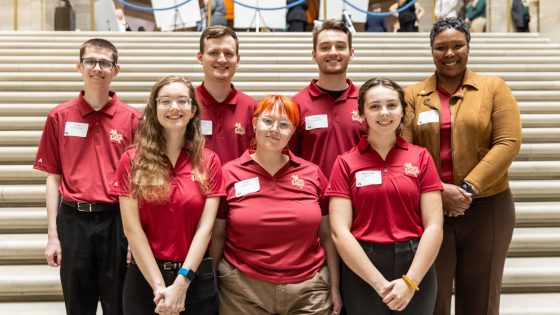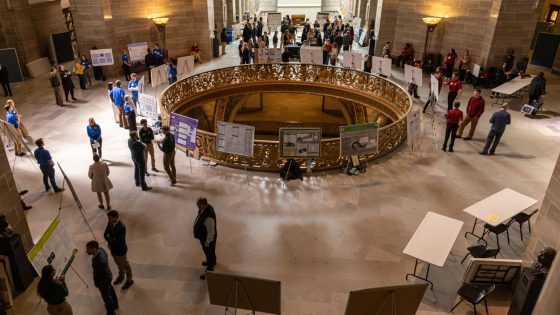On Jan. 18, the ninth day of the 2024 legislative session, a bill essential to balancing the state budget was placed first in line on the Senate’s calendar for debate.
On the same day, a bill expanding an education scholarship program was also put on the calendar, second in line.
Last week, the education bill narrowly passed the Missouri House on its way to Gov. Mike Parson for his signature.
The bill that would balance the budget by renewing roughly $4 billion worth of medical provider taxes that fund Medicaid hasn’t received as much as a minute of debate.
At a news conference last week, Sen. Doug Beck, an Affton Democrat, said the delays are frustrating.
“It’s completely ridiculous that we’re perfecting the Senate bill on gold and silver on a Thursday when we could have all week long been talking about the” taxes,” he said.
While the Medicaid taxes, known as the federal reimbursement allowance, have gotten scant attention inside the Senate, there’s been plenty of talk outside the chambers.
Senate members of the Missouri Freedom Caucus, six of the 24 Republicans in the chamber, have promised to filibuster renewal of the taxes until two other legislative items are finished. Both are Senate-passed bills awaiting votes in the House.
The first is a bill banning Planned Parenthood from the Medicaid program. The second is a proposed constitutional amendment to alter how a majority is determined for voter-initiated constitutional amendments.
But even if those bills pass, the Freedom Caucus has also said it will demand the federal reimbursement allowance legislation include an expiration date before they will consider letting it come up for a vote. And at that point, other amendments — such as Medicaid work requirements — may also become mandatory for the Freedom Caucus to and their filibuster.
“We’re going to continue to fight for a sunset, and maybe there’s some other provisions that fit on this bill,” said Sen. Bill Eigel, a Weldon Spring Republican running for governor.
The budget, which must be completed by May10, can’t be finished in committee until the provider taxes are secured for the future, said Senate Appropriations Committee Chairman Lincoln Hough, a Springfield Republican running for lieutenant governor.
“I don’t really deal in ultimatums,” Hough said. “I deal with the constitutional necessity of passing a budget in the state, not trying to leverage someone to get something else done.”
Hough scheduled a hearing for Tuesday to discuss changes to the House-passed budget spending $50.7 billion. Senate floor debate on the budget is expected the following week.
“We’re running up against the end, and FRA and the budget, and all of these things, are in front of us that I think will take center stage in the coming days,” Senate President Pro Tem Caleb Rowden said last week.
Democrats, who hold the minority in both legislative chambers, said they’re tired of waiting for Republicans to bury their factional warfare.
House Minority Leader Crystal Quade opened her Thursday press conference with criticism of the House GOP for not moving independently of the Senate. Quade filed the only bill in the House to extend the taxes, but it has not been referred to a committee.
“If we do not get this passed,” Quade said, “everything else we’re doing when it comes to the budget or funding mechanisms, is just smoke and mirrors.”
Since 1992, Missouri has taxed hospitals – and later nursing homes, ambulance providers and pharmacies – to support the Medicaid program. The money becomes part of the state’s share of the federally sponsored program.
This year, Missouri must provide 34.69% of the cost of most Medicaid services. An exception is the group covered by a 2020 ballot initiative that used a provision of the Affordable Care Act to cover adults aged 18 to 64. The federal government pays 90% of the cost for that group.
The budget proposed by Parson in January pegs the general revenue cost for the entire Medicaid program at 21.7% of the projected $17.8 billion total. The remainder of the state’s share, $1.7 billion in Parson’s budget, comes from reimbursement allowances and other funds.
There is no general revenue in the $3 billion budget line covering the cost of the adult expansion group. Instead, much of the state’s share comes from money banked as a bonus federal share of the regular Medicaid program as an incentive to expand coverage.
The provider taxes are slated to supply $50 million toward the cost of Medicaid expansion in the coming year’s budget, drawing $450 million in federal funds. There’s another $950 million from the provider taxes used across 16 lines of the Medicaid budget, drawing at least $1.8 billion in federal funds.
The taxes have been renewed 16 times during regular legislative sessions. That regular process was disrupted in 2021, when first an effort to ban payments for some contraceptive medications, and later the question of banning Planned Parenthood as a Medicaid provider, forced lawmakers to have to return for a special session to extend the taxes.
The taxes expire Sept. 30 without passage of a renewal bill.
If reimbursement allowance funds aren’t available, the Medicaid budget will have to be rewritten and cuts made to make up the shortfall, Hough said.
He’s ready to debate the bill at any time, he told reporters.
“I’m waiting on the floor leader just say, ‘Hey, let’s go to the FRA and let’s get this thing done,’” Hough said. “I think she’s got competing interests with our small band of merry men out there on the floor all the time that you know, constantly slow things down and want to say we haven’t gotten anything done.’
Missouri has accumulated a surplus that stood at $6.4 billion at the end of March.
Eigel said he’s not concerned that the state can fund its obligations without the provider taxes.
“We have more than enough money with or without the FRA to meet the obligations of the state,” Eigel said.
Sen. Rick Brattin, speaking at a news conference Thursday, said the goals the Freedom Caucus is working towards are more attainable if members are willing to push against the constitutional deadline for passing the budget.
“We can get a lot of things done and I think that’s what we have to leverage to ensure we’re able to protect the Constitution, to make sure that abortion isn’t in our Constitution and to fight against that,” Brattin said. “We’re going to do everything by every means possible.”
Senate Democrats are ready to help pass the provider taxes without the Freedom Caucus demands and to get the budget through on time, Minority Leader John Rizzo of Independence said.
He thinks the deadlines will be met, he said.
“You’re gonna probably see a lot of other bills fall by the wayside because they’re unable to move on FRA and on a budget pretty quickly,” Rizzo said. “I don’t think it’s time to panic quite yet.”
For more from our partner, click here to subscribe.




